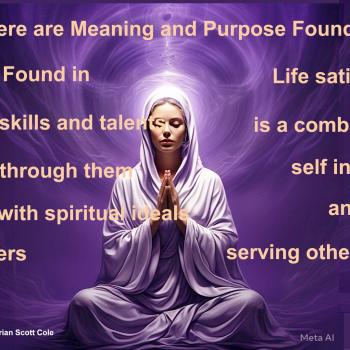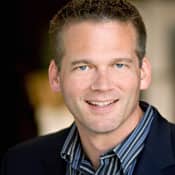 Andrew Cohen, founder of EnlightenNext, is redefining the spiritual ideal of enlightenment for the 21st century. Through his revolutionary philosophy, his award-winning magazine EnlightenNext, and his work with thousands of individuals and groups around the world, he is dedicated to creating nothing less than a revolution in consciousness and culture. He and Leo Brunnick, founder of Patheos, shared a conversation about Cohen's new book, Evolutionary Enlightenment: A New Path to Spiritual Awakening.
Andrew Cohen, founder of EnlightenNext, is redefining the spiritual ideal of enlightenment for the 21st century. Through his revolutionary philosophy, his award-winning magazine EnlightenNext, and his work with thousands of individuals and groups around the world, he is dedicated to creating nothing less than a revolution in consciousness and culture. He and Leo Brunnick, founder of Patheos, shared a conversation about Cohen's new book, Evolutionary Enlightenment: A New Path to Spiritual Awakening.
What is Evolutionary Enlightenment?
Evolutionary Enlightenment is the marriage of the traditional mystical experience of the higher state of consciousness known as enlightenment with our emerging scientific understanding of what it means to be part of an evolutionary process that had a beginning in time 14 billion years ago.
So expand a little bit on how that's different from traditional—or eastern—views of enlightenment?
Well, the eastern notion of enlightenment emphasizes a notion of transcendence, and it is based upon the awakening to the deepest parts of the self. We access this enlightenment through meditation, which typically works through releasing our identification with the content of consciousness. When we release and let go of our identification with thought and memory, as that falls away from the center of awareness, we lose our awareness of time.
If we continue this process, eventually we lose track of the mind, we lose track of time; time disappears, the world disappears, and we eventually even lose awareness of our own physical form. The traditional liberating discovery of the great mystics—from all the great traditions but especially the mystics from the east—is that when the mind, time, world, and form disappear, including our memory of any events that ever happened in time, the essence of who I am and who we all are is still there.
So when the mind, time, and world disappear, I realize that I still exist and I discover myself to be formless beginning. I realize an endless discovery of my immortal nature, called the unborn or the uncreated. So the traditional notion of enlightenment is based upon the experience or discovery of the deepest part of the self that's never been born within the stream of time.
The reason that this has been a perennial source of spiritual collaboration is because when you discover that the deepest part of yourself is unborn and uncreated, and therefore untouched by anything that's ever happened in time, you realize that the deepest part of yourself is always free. And in that part of the self there's no fear, there's no desire, and there's no trauma because there's no memory of anything like that. You are awakening the deepest part of the self, which I relate to the same empty primordial void out of which the entire creative process emerged with the big bang.
That would be a little synopsis of traditional enlightenment, but in what I call the Evolutionary Enlightenment, we are pointing to a different manifestation and expression of the absolute. In Evolutionary Enlightenment, all of manifestation is being driven or compelled by the energy and intelligence of the creative process, the Eros, a dynamic, energetic, developmental process. We interpret that as a creative aspiration that emerged from emptiness and created the uniquely human compulsion to innovate and give rise to that which is new. The human experience of that creative compulsion is the ecstatic urgency that gave rise to the material universe.
In a traditional eastern enlightenment, the experience of absolute spirit is the experience of understanding. And in Evolutionary Enlightenment, it is the awakening to an experience of eros or that ecstatic urgency, that ecstatic compulsion to give rise to emergence or to engage with the creative process in such a way that potentiality will actually result from our conscious cooperation with the process.
So, the form and expression of enlightenment is a kind of a deep surrender to and a conscious engagement with the creative process to give rise to that which doesn't yet exist. It's a very active and deeply engaged expression of spiritual freedom and yet deliberate engagement with the process. And just as in traditional enlightenment, in order to be able to transcend the mind and transcend time and transcend forms so that we can experience the unborn and the uncreated timeless, formless death, eventually we have to let go of the fears and desires of the physiological self.





